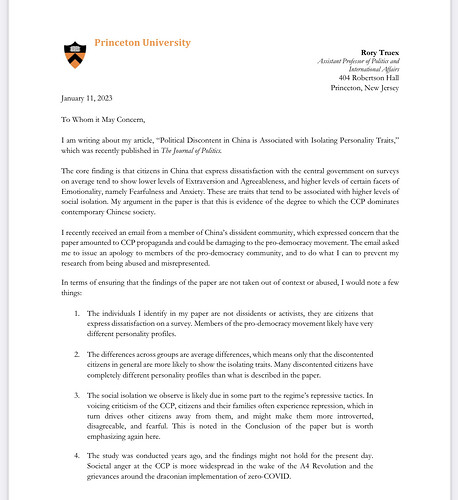January 11, 2023
To Whom it May Concern,
Rory Truex
Assistant Professor of Politics and International Affairs 404 Robertson Hall
Princeton, New Jersey
I am writing about my article, “Political Discontent in China is Associated with Isolating Personality Traits,” which was recently published in The Journal of Politics.
The core finding is that citizens in China that express dissatisfaction with the central government on surveys on average tend to show lower levels of Extraversion and Agreeableness, and higher levels of certain facets of Emotionality, namely Fearfulness and Anxiety. These are traits that tend to be associated with higher levels of social isolation. My argument in the paper is that this is evidence of the degree to which the CCP dominates contemporary Chinese society.
I recently received an email from a member of China’s dissident community, which expressed concern that the paper amounted to CCP propaganda and could be damaging to the pro-democracy movement. The email asked me to issue an apology to members of the pro-democracy community, and to do what I can to prevent my research from being abused and misrepresented.
In terms of ensuring that the findings of the paper are not taken out of context or abused, I would note a few things:
- The individuals I identify in my paper are not dissidents or activists, they are citizens that express dissatisfaction on a survey. Members of the pro-democracy movement likely have very different personality profiles.
- The differences across groups are average differences, which means only that the discontented citizens in general are more likely to show the isolating traits. Many discontented citizens have completely different personality profiles than what is described in the paper.
- The social isolation we observe is likely due in some part to the regime’s repressive tactics. In voicing criticism of the CCP, citizens and their families often experience repression, which in turn drives other citizens away from them, and might make them more introverted, disagreeable, and fearful. This is noted in the Conclusion of the paper but is worth emphasizing again here.
- The study was conducted years ago, and the findings might not hold for the present day. Societal anger at the CCP is more widespread in the wake of the A4 Revolution and the grievances around the draconian implementation of zero-COVID.
I will close by formally apologizing to any Chinese citizen who felt wronged or misrepresented in any way by my research. I deeply admire China’s pro-democracy community, those that have “the courage to stand alone.” I embarked on this project in hopes of better understanding how and why certain types of people come to reject the CCP regime, and I deeply regret if the findings ever undermine those pushing for political and socia
I will close by formally apologizing to any Chinese citizen who felt wronged or misrepresented in any way by my research. I deeply admire China’s pro-democracy community, those that have “the courage to stand alone.” I embarked on this project in hopes of better understanding how and why certain types of people come to reject the CCP regime, and I deeply regret if the findings ever undermine those pushing for political and social change.
Sincerely, Rory Truex

